Top Animal-Based Foods Rich in Folate for Carnivores
Essential Nutrients Explained
Folate, also known as vitamin B9, is essential for numerous bodily functions, including DNA synthesis and red blood cell formation. While the carnivore diet focuses on animal-based foods, it can still provide adequate amounts of this crucial nutrient. Certain animal-based foods such as liver, egg yolk, shrimp, caviar, oysters, and cod are particularly rich in folate.
The inclusion of these foods in a carnivore diet ensures that the body receives adequate folate, supporting cellular functions and overall health. Liver, in particular, is a powerhouse of vitamins and minerals, offering not just folate but also vitamin B12, further benefiting those adhering to a meat-centric lifestyle. This nutrient-dense organ meat is a staple that can help prevent deficiencies often associated with restrictive diets.
Moreover, for individuals following a carnivore diet, maintaining sufficient folate levels is necessary to avoid health issues like anemia and birth defects. Consuming a variety of these folate-rich animal foods can help mitigate the risks and provide the essential nutrients needed for optimal health.
The Importance of Folate in a Carnivore Diet
Folate, a vital micronutrient also known as vitamin B9, plays essential roles in DNA synthesis, cell division, and overall brain function. Integrating adequate sources of folate into a carnivore diet is crucial for maintaining optimal health, especially for those relying heavily on animal-based foods.
Understanding Folate and Its Role
Folate supports basic cellular functions, including DNA and RNA synthesis, which are critical processes for growth and repair. It is also vital for the production of red blood cells and for proper brain development and function. Unlike many other vitamins, folate is water-soluble and not stored extensively in the body, necessitating regular intake from diet or supplements.
Natural folate is primarily found in leafy greens and legumes, which are excluded in a strict carnivore diet. Therefore, carnivores must find alternative sources within their dietary scope to avoid deficiency. High-folate animal-based foods such as liver and egg yolks become essential, ensuring that bodily functions dependent on folate remain unimpeded. Addressing this is particularly important for pregnant women to prevent neural tube defects in fetuses.
Benefits of Folate for Carnivores
Including sufficient folate in a carnivore diet contributes significantly to overall health. It aids in maintaining healthy brain function and can help reduce the risk of neurological issues. Folate is essential for cellular growth and regeneration, which are necessary for tissue health and recovery.
For those on a carnivore diet, consuming foods high in folate such as beef liver or incorporating folic acid supplements can mitigate potential deficiencies. Regular intake helps prevent symptoms like fatigue, mouth sores, and poor immune function linked to low folate levels. Optimizing folate intake ensures that the myriad benefits of this essential micronutrient are harnessed, even in a diet focused largely on animal-based foods.
Sources of Folate in Animal-Based Diets
Folate is essential for DNA synthesis and repair, making it crucial for growth and cell division. Animal-based diets can provide plenty of folate through certain foods.
Organ Meats as Folate Powerhouses
Organ meats, particularly liver, are among the richest sources of folate. Beef liver stands out, offering about 215 micrograms of folate per 3-ounce serving. Pork liver and chicken liver are also excellent sources. These organs are nutrient-dense, providing not only folate but also protein, vitamins A, B12, and iron. Regular consumption of organ meats can help meet daily folate requirements efficiently. For those adhering to a carnivore diet, incorporating liver into their meals can significantly elevate their folate intake.
Muscle Meats and Folate Content
Muscle meats, though not as rich in folate as organ meats, still contribute to overall dietary intake. Cuts like beef, pork, and lamb contain moderate levels of folate. For example, a 3-ounce serving of cooked beef provides around 7 micrograms of folate. While this amount is lower than that found in liver, muscle meats also supply essential proteins and amino acids. Consuming a variety of muscle meats along with organ meats ensures a broader spectrum of nutrients, supporting overall health and well-being for those on a carnivore diet.
Dairy and Eggs: Are They Folate-Rich?
Dairy and eggs offer some folate but in lower amounts compared to organ and muscle meats. A large egg delivers approximately 25 micrograms of folate, while a cup of whole milk provides about 12 micrograms. Though these values are modest, they still contribute to daily folate intake. Dairy products also offer vital nutrients like calcium and vitamin D, while eggs provide high-quality protein and other essential vitamins. Including dairy and eggs can be beneficial for diversifying nutrient sources in an animal-based diet.
Comparing Folate in Animal Vs. Plant-Based Foods
Folate is a crucial nutrient required for various bodily functions, and both animal-based and plant-based foods offer this vitamin, though in different forms and quantities. Understanding the bioavailability and sources from each can guide dietary choices.
Folate Bioavailability in Animal Products
Animal-based foods such as liver, egg yolks, and certain dairy products contain folate in a highly bioavailable form. The folate in these foods is more easily absorbed by the human body compared to that found in plant-based foods. This efficiency is due to animal folate being mostly in the reduced tetrahydrofolate form, which is directly usable by humans.
Liver, in particular, is a powerhouse of folate, providing a significant portion of the daily requirements. For example, just 3 ounces of beef liver can offer up to 215 micrograms of folate, nearly half the recommended daily intake for adults. Egg yolks also contribute notably but in lesser amounts compared to liver.
Folate in Plant-Based Foods: A Contrast
Plant-based foods like legumes, leafy greens, and certain fruits are rich sources of folate. Foods such as spinach, beans, and lentils are among the top plant sources. For instance, a cup of cooked spinach can provide about 263 micrograms of folate, surpassing even beef liver in quantity.
Despite high folate content, the bioavailability in plant-based sources is generally lower. This is due to the presence of anti-nutrients like phytates and fiber, which can inhibit folate absorption. Additionally, the folate in plants is often in a form that requires conversion by the body, making the process less efficient compared to folate from animal sources.
In summary, while both animal-based and plant-based foods can offer substantial amounts of folate, the bioavailability and ease of absorption differ significantly, influencing dietary choices.
RDA of Folate and Dietary Considerations
The Recommended Daily Allowance (RDA) of folate varies based on age and health status. Adjusting folate intake appropriately ensures that individuals meet their nutritional needs and prevent deficiencies.
Recommended Daily Allowance of Folate
The RDA for folate is defined by dietary folate equivalents (DFEs). Adults and children aged 4 years and older require 400 mcg of DFEs per day. This calculation considers the higher bioavailability of folic acid compared to naturally occurring folate. For instance, 1 mcg of naturally occurring folate equals 1 mcg DFE, and 1 mcg of folic acid from supplements or fortified foods equals 1.7 mcg DFE.
Folic acid is converted more efficiently in the body, so fortified foods and supplements are valuable for meeting the RDA. For pregnant women, the RDA increases to 600 mcg DFE to support fetal development. Lactating women need slightly less, at 500 mcg DFE. Meeting these recommendations is crucial to prevent folate deficiency and support overall health, including DNA synthesis and red blood cell formation.
Adjusting Folate Intake by Age and Health
Folate needs vary by life stage and health status. Infants and young children require lower amounts, ranging from 65 mcg for infants to 150-300 mcg for older children. Adolescents transitioning to adulthood should aim for the adult RDA of 400 mcg DFEs.
In cases of health conditions, such as chronic kidney disease or intestinal disorders, folate absorption may be impaired, necessitating increased intake. Likewise, individuals pursuing weight loss through gastric bypass surgery might need higher supplementation.
Special attention should be given to folate intake during pregnancy and lactation. Pregnant women require 600 mcg DFEs to prevent neural tube defects in the developing fetus. Effective dietary planning and possible supplementation help ensure adequate folate levels, supporting both maternal and infant health.
Nutrient Density and Folate Measurement in Foods
Animal-based foods can be nutrient-dense, providing essential vitamins and minerals, including folate. Understanding nutrient density and how folate is measured in foods helps individuals make informed dietary choices.
What Constitutes a Nutrient-Dense Food?
Nutrient-dense foods are those that provide high levels of essential nutrients relative to their calorie content. These foods offer vitamins, minerals, and other beneficial compounds without a high caloric load.
Eggs, for example, are highly nutrient-dense. Per 100 grams, eggs provide significant amounts of choline (53.4% DV), selenium (44% DV), and riboflavin (30.2% DV). These nutrients support various bodily functions, making eggs a valuable part of a balanced diet.
Animal-based sources also excel in nutrient density compared to many plant foods, often delivering higher concentrations of certain nutrients, including protein and vitamin B12.
Methods of Measuring Folate in Foods
Folate content in food is crucial for health, as this B-vitamin supports DNA synthesis and repair, and helps prevent certain anemia types. To measure folate, laboratories typically use chromatography techniques, such as High-Performance Liquid Chromatography (HPLC). This method separates and quantifies folate compounds from food samples.
In the context of nutrient labeling, folate values are expressed in micrograms (mcg). For instance, a standard serving of animal liver, renowned for its high folate content, might contain hundreds of micrograms of folate per 100 grams, far exceeding that of many other foods.
These measurements ensure accurate dietary assessments and aid in devising specific nutritional strategies, especially for populations at risk of folate deficiency.
Enhancing Folate Intake: Complementary Nutrients
To optimize folate intake from animal-based foods, it's essential to consider the role of other vitamins and the importance of fat for absorption. Specific vitamins enhance folate utilization, while dietary fats aid in its absorption, making a balanced approach crucial.
Folic Acid and Other Vitamin Interactions
Folic acid, the synthetic form of folate, works best in conjunction with other B vitamins, particularly vitamin B12. This synergy is vital for DNA synthesis and cell repair. Animal-based foods like liver and eggs provide both folate and vitamin B12, making them excellent choices.
Vitamin C also enhances folate stability and absorption. Including citrus fruits or bell peppers in meals can be beneficial. Vitamin A, found in animal livers, supports cell functions that rely on folate. Thus, combining sources rich in these vitamins can boost overall folate efficacy.
The Importance of Fat for Folate Absorption
Dietary fat is crucial for the optimal absorption of folate. Fatty acids in animal-based foods, such as those in fatty fish or beef tallow, help dissolve folate for better absorption in the digestive tract. Including healthy fats like omega-3 fatty acids can enhance folate uptake.
Animal sources such as salmon and grass-fed beef provide both folate and beneficial fats. Cooking with these ingredients can improve the bioavailability of folate. Ensure the diet includes adequate fat to complement folate-rich foods for maximum health benefits.
To find the best deals, get tallow online!
Health Considerations and the Carnivore Diet
The carnivore diet focuses on animal-based foods, raising questions about its implications for heart health and inflammation. Specific nutrients like folate and the diet's effect on cholesterol are key areas of concern.
Impact of Folate on Inflammation and Heart Disease
Folate is crucial for DNA synthesis and repair. Animal-based sources such as liver and eggs provide this essential nutrient. Folate is significant because it helps reduce homocysteine levels in the blood. Elevated homocysteine is linked to increased inflammation and greater risk of heart disease.
The carnivore diet, rich in these folate sources, may help manage inflammation. However, it is important to ensure adequate folate intake due to the exclusion of plant-based foods, which are commonly rich in folate.
Carnivore Diet and Its Effect on Cholesterol Levels
The carnivore diet emphasizes foods high in saturated fats, such as fatty meats. These fats can increase LDL (bad) cholesterol levels, which is associated with a higher risk of heart disease. Conversely, HDL (good) cholesterol may also increase, which could provide some protective benefits.
Monitoring cholesterol levels is important for those on a carnivore diet. Regular blood tests can help assess the impact of this dietary pattern on heart health. Balancing saturated fat intake and considering leaner cuts of meat may mitigate some risks.
Practical Tips for a Folate-Rich Carnivore Diet
Ensuring a folate-rich diet on a carnivore plan requires strategic selection of food sources, appropriate portion control, and sometimes supplementation. Achieving an optimal intake of folate ensures various bodily functions, including cell growth and DNA formation, are adequately supported.
Incorporating Variety in Animal-Based Sources
A diverse range of animal products supports better folate intake. Liver, particularly from beef and chicken, is especially high in folate. Incorporating poultry, eggs, and organ meats can also contribute significantly. Fatty fish such as salmon and sardines offer not just folate but also omega-3 fatty acids.
Understanding Portion Sizes and Frequency
Portion size and frequency ensure consistent nutrient intake. It is suggested to consume 3-4 ounces of liver per week to avoid potential toxicity due to high vitamin A content. Balance is key; include liver 1-2 times a week, while other meats like poultry and fish should make up regular meals.
Eggs, offering a moderate amount of folate, can be eaten daily, considering 2-3 eggs as a balanced portion for breakfast or snack.
Supplements: When They Are Necessary
Despite efforts to consume folate-rich foods, some individuals might need supplements. Particularly, women of reproductive age or those with certain health conditions should consider folic acid supplements to ensure adequate intake. Always consult with a healthcare provider to determine the appropriate dosage and need for supplementation, especially to avoid potential over-supplementation.
For the largest selection, try buying folic acid supplement online!
Challenges and Considerations for Vegans and Vegetarians
Vegans and vegetarians often face specific challenges related to nutrient intake, particularly concerning folate. This tends to require careful dietary planning and a reliance on certain food categories to meet their nutritional needs.
Navigating Folate in a Non-Carnivore Diet
Folate, essential for DNA synthesis and repair, is abundant in certain animal-based foods like liver and eggs. For vegans and vegetarians, this presents a challenge. While plant-based sources of folate exist, such as leafy greens, legumes, and citrus fruits, they may not always provide the same bioavailability.
Meal planning becomes crucial. They need to incorporate a variety of folate-rich foods to ensure proper intake. Additionally, the natural folate content in these foods can be less stable, and cooking methods like boiling can reduce folate levels, requiring even more careful preparation.
Fortified Foods and Legume-Based Options
To address potential deficiencies, vegans and vegetarians often turn to fortified foods. Products like fortified cereals, plant-based milk, and nutritional yeast are commonly used to boost folate intake. These fortified options help bridge the gap, making it easier to meet daily requirements without the need for supplementation.
Legumes, including beans, lentils, and peas, are another valuable option. They not only provide substantial amounts of folate but also add protein and fiber to the diet. Incorporating a mix of these foods can enhance overall nutrient intake and support a balanced plant-based diet.
Incorporating these strategies helps vegans and vegetarians manage their folate intake more effectively, ensuring they maintain adequate levels for optimal health.










